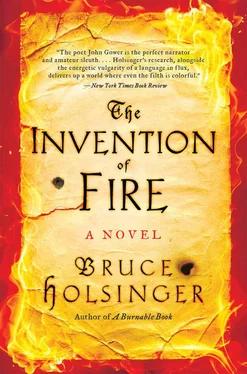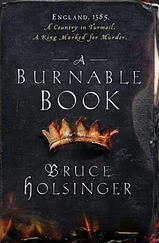Bruce Holsinger - The Invention of Fire
Здесь есть возможность читать онлайн «Bruce Holsinger - The Invention of Fire» — ознакомительный отрывок электронной книги совершенно бесплатно, а после прочтения отрывка купить полную версию. В некоторых случаях можно слушать аудио, скачать через торрент в формате fb2 и присутствует краткое содержание. Год выпуска: 2015, Издательство: HarperCollins, Жанр: Исторический детектив, на английском языке. Описание произведения, (предисловие) а так же отзывы посетителей доступны на портале библиотеки ЛибКат.
- Название:The Invention of Fire
- Автор:
- Издательство:HarperCollins
- Жанр:
- Год:2015
- ISBN:нет данных
- Рейтинг книги:3 / 5. Голосов: 1
-
Избранное:Добавить в избранное
- Отзывы:
-
Ваша оценка:
- 60
- 1
- 2
- 3
- 4
- 5
The Invention of Fire: краткое содержание, описание и аннотация
Предлагаем к чтению аннотацию, описание, краткое содержание или предисловие (зависит от того, что написал сам автор книги «The Invention of Fire»). Если вы не нашли необходимую информацию о книге — напишите в комментариях, мы постараемся отыскать её.
The Invention of Fire — читать онлайн ознакомительный отрывок
Ниже представлен текст книги, разбитый по страницам. Система сохранения места последней прочитанной страницы, позволяет с удобством читать онлайн бесплатно книгу «The Invention of Fire», без необходимости каждый раз заново искать на чём Вы остановились. Поставьте закладку, и сможете в любой момент перейти на страницу, на которой закончили чтение.
Интервал:
Закладка:
During all of this my skin had cooled to near numbness. Now feeling stole back into my limbs. I risked a shallow breath, then a deeper one, the pure and saving air filling my lungs, and with it came the realization that I still lived. That I could see. My very ribs seemed to open once more to the world. I looked up at the looming west face of Aldgate, where a bored guard observed my plight from a great height over the hoarding-walk. Another breath and I felt ready to move, slowly at first, then with more confidence as my sight returned to its full if weakened capacity. I went through the city to the bridge with a new aim in mind, my affliction winning out against my pride and fear.
Chapter 13
When did I first sense this creeping blindness? For the longest time I felt it as a dog suffers a single flea: an occasional nuisance, rarely acute, beneath notice or mention. Only in the last five years had it interfered somewhat with my everyday life, and only in the last three had it forced me to alter old habits and find new crutches: a head turned slightly to the side, additional candles on the desk, a hand more often raised against a brightening sun. Since Sarah’s death I had taken particular notice of the fully blind, those old men sticking their way along the pavers, rattling for alms. There goes John Gower, I would think, a few years hence.
The surgeon Thomas Baker was letting a pair of rooms atop a grocer’s shop in Cornhill, one for his accommodation, the other for procedures. The grocer, George Lawler, had purchased a grander house in the Mercery, returning with his wife to the shop along Broad Street only on select days of the week to sell spices and dried fruits to the wealthier denizens of the ward. On the afternoon I visited Lawler’s the shop was closed, so I walked around back and took the outer stairs to the surgeon’s rooms on the third floor. As I neared the top a woman’s high and muffled moans could be heard, a keening sound that nearly chased me down again.
Baker’s door stood open, allowing the surgeon to perform his grisly work in the morning’s full light. At the moment this consisted of the draining of an abscess from the bound leg of a young woman, who lay writhing on his table and grinding at a rag between her teeth. Trembling limbs glazed with sweat, grunts of pain and effort, Baker’s apprentice and another man pinning her arms. Not wanting to interrupt or subject the woman to any further humiliation, I descended and ran a few errands in the district, returning an hour later to find Baker’s apprentice mopping up the last remnants of blood and bile from the floor. He tossed the rags aside and took up a bucket of sawdust and ash, which he sprinkled in a thin layer over the surface. The room on the whole was crowded but neatly and efficiently so, with an operating table angled across the center, a bulky chair by the door, and several shelves and tables laid neatly with the tools of the surgical craft. On a high stand by the table a thick volume lay open to a center folio, its opened pages spattered with old blood.
“Is Baker about?” I said to the apprentice.
He nodded slightly, then glanced at the door, where Baker had appeared bearing a bucket of surgical tools.
“Why, Master Gower. Good welcome to you.”
“And to you.” I blinked, agitated. “I am here about my eyes.”
“Ah,” said Baker, placing a hand on my arm. He gave the bucket of tools to his apprentice and guided me toward the large chair near the door. His grip was firm but gentle, as if he were leading an old man already blind. “Chaucer told me to expect you.”
“He did, did he?” I sounded haughty, even to myself.
“He is a great friend to you, I can see this. Please, sit here.”
Baker pushed around the heavy examining chair to take maximum advantage of the light. I sat and adjusted myself to the unfamiliar arrangement as the physician and his apprentice placed a table and tools to each side. The chair’s joint between the seat and back had been constructed so as to allow its user to rest at various angles, with pegs to adjust the position of both. Baker took a high stool to my left, while his apprentice stood to my right-his sole task, it seemed, to keep my eyes from shutting at all cost. For this he used a pincerlike instrument with rounded ends, which pressed into my eyelids and separated them for the surgeon’s convenience. The sensation was not unpleasant, as the touch of the metal was cool and smooth, and I appreciated the sharpness and clarity that came with widened eyes.
Once the apprentice had performed this opening procedure on my left eye, Baker used a small hook to pull up the lid, then a flattened metal plane to scrape gently along the inner rim. He looked across my prostrate form at his apprentice. “No ungula or pannus. Do you see?”
The apprentice nodded. “ Si. ”
“What about cataracts?” Baker asked, keeping my lid stretched forward.
The young man leaned over, peering carefully. “No sign of cataracts, master,” he said.
“ Bene. Now the right.” He switched eyes, placing his thumb and forefinger gently on my cheek as the apprentice spread the skin. The right eye having garnered the same verdict from master and apprentice, Baker lifted a tubelike device from the table at his side and used it to peer into the depths of the opened eye. His apprentice moved a lantern above my face, shifting it slightly back and forth at his instruction until the examination was complete.
“That will be all, Agnolo,” said Baker, his hand at my elbow. “Now see about those new chisels, will you? And we have a case of earworm tomorrow. We’ll need juice of honeysuckle and calamint and we are depleted of both. You know where to go?”
“ Si, signore. ” The apprentice left us, clomping down the rear stairs.
When he had gone Baker helped me sit up straight, and I swung my legs off the chair. He leaned back and regarded my face. “I see no external evidence of a disease or injury, Master Gower. No cataracts, no webbing on the eyelids nor excessive phlegm in the pouches. No floating matter or obstruction in your eyeball, either. How do you find reading?”
“Still bearable, though more difficult by the day,” I admitted. “It was once pure pleasure. Now it is something of a labor. I find myself avoiding it sometimes.” Like a dog veering from the room where its master died.
“And generally? How would you describe this gradual loss of sight?”
“It feels to me that my world is growing smaller,” I said, hearing the weight in my voice. “Dimmer as well, as if a series of thin veils were being lowered before my eyes. Every month or so I will realize a new veil has come down, as things I once saw clearly appear blurred or dull. The streets of London are not as colorful as they once were. The faces of friends grow indistinct, hazed.”
“You speak like the poet you are,” said Baker, smiling kindly. “You have thought a great deal about your encroaching blindness.”
“Blindness,” I said, feeling the weight of it. “A bleak word.” And a commonplace figure: for stupidity, dumbness, ignorance in all its forms. How often had I used the device in my own verse, attempting to capture the felt condition of man’s distance from God, from love, from grace? To imagine that I was coming to embody such unseeing oblivion seemed impossible to accept.
“Your condition will grow only worse, I’m afraid,” said Baker. “If you were showing cataracts I could help you, but in a case like this, where the cause of deterioration is hidden, surgery would be foolish.”
“There is nothing you can do to arrest it, no procedure to perform in a case like mine?”
“A lancet peeling your eye, is that what you would like, Master Gower?”
Читать дальшеИнтервал:
Закладка:
Похожие книги на «The Invention of Fire»
Представляем Вашему вниманию похожие книги на «The Invention of Fire» списком для выбора. Мы отобрали схожую по названию и смыслу литературу в надежде предоставить читателям больше вариантов отыскать новые, интересные, ещё непрочитанные произведения.
Обсуждение, отзывы о книге «The Invention of Fire» и просто собственные мнения читателей. Оставьте ваши комментарии, напишите, что Вы думаете о произведении, его смысле или главных героях. Укажите что конкретно понравилось, а что нет, и почему Вы так считаете.












